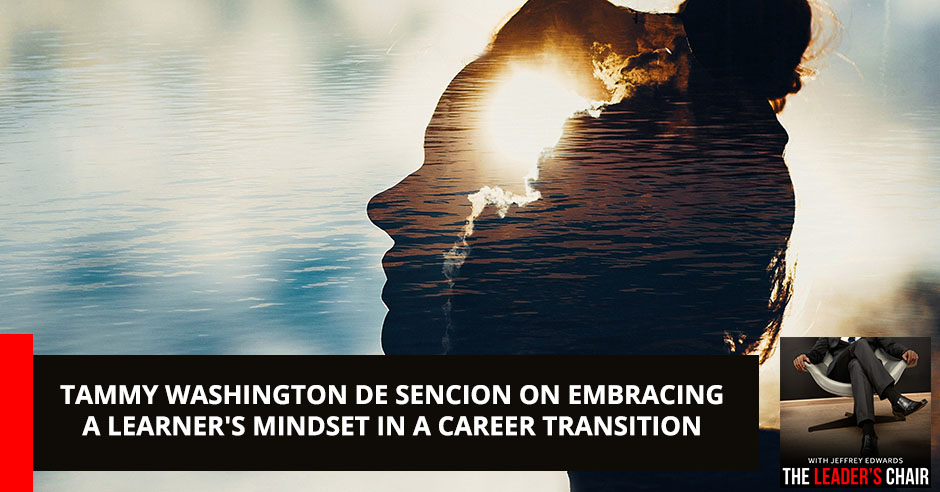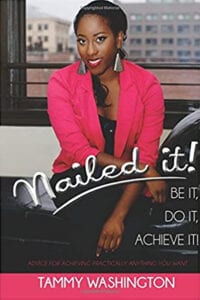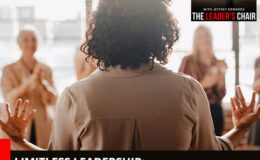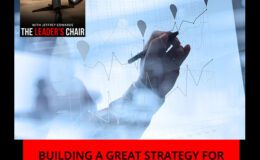
Bringing all of your knowledge and experiences from one job to the next will make your journey to the next level fulfilling and worthwhile. But another essential attitude to have during a career transition is to revert into a learner once again. Jeffrey Edwards sits down with Tammy Washington de Sencion to share how embracing the student-like mindset allowed her to transition smoothly from corporate training to entrepreneurship. She talks about how her current career taught her to put herself in the shoes of her team members, get the right mentorship, and learn from every good or bad experience. Tammy also explains how she discovered an important lesson by becoming a business leader: solving problems by always seeking the easy path to peace.
—
Listen to the podcast here:
Tammy Washington De Sencion On Embracing A Learner’s Mindset In A Career Transition
I was thinking about the idea behind that transition from being the independent individual performer, how you make that transition from being someone who’s recognized for your performance and being seen as that rockstar in your space. Now, you’re moving to a whole new area of responsibility and expectations. Many times, it’s not clear on what that path is going to be and what to expect. Our guest is someone that I’ve had the pleasure of working with. She has worked in corporate environments. She’s worked in corporate training. She took that leap many years ago and transitioned going from a corporate environment to becoming a professional speaker, moving into entrepreneurship, author of the book called Nailed It!. She’s also seen as a leader among many people she works with, helping them in establishing their financial planning and also helping them to set themselves up for success long-term with their finances. It’s with great pleasure to introduce to you our guest, Tammy Washington de Sencion. Hello, Tammy.
I’m excited to be here.
It’s wonderful to have you here. I’m excited to start and ask you, where are you situated in the world at this point in time?
I live in Punta Cana, Dominican Republic. I have a beach life, which is amazing. I have been here for a few years. It’s exciting.
Whenever you are transitioning careers or roles, you have to go back to being a student. Click To TweetGoing back to the days when you were doing corporate training and you look back now, did you ever imagine you would be here in the Dominican Republic doing the work that you’re doing, being a trainer and teacher to people?
It’s funny because I never thought that I would be in the Dominican Republic. It wasn’t even on my radar. As a matter of fact, when people would say like, “Where do we want to go on vacation?” They would bring up Punta Cana I’m like, “That’s for college students. No.” Even though I’d never been but that was the mindset that I had had about Punta Cana. I had always had a dream of living by the ocean. I had always had a dream of motivating and helping people all over the world. For me, that was the image that I focused on. That’s what I constantly visualize. That was what I worked towards. This is the life that I received from all of that, visualizing and working towards it. I have a life where I have the beach life. I work with people all over the world, helping them and impacting them to create a lifestyle that they desire. For me, it all came together. That’s what I always tell people sometimes. “Don’t be so specific. You want to have a general goal for where you want to go. That way, you have the ability to be flexible in case you change.”
What were some of the changes that you had that helped you on that path, going from corporate training, doing the boardroom, ascribe training classes that you use to talk about, and now doing the work that you’re doing? When you think back, who was Tammy back then and who is the Tammy that you would describe now?
One of the things that I always have to keep top of mind is to always be a student. Whenever you are transitioning, whether it’s transitioning careers, transitioning roles, you have to go back to being a student. I had been in corporate training for many years. By the time I went back to entrepreneurship in Corporate America, I pretty much had things like I wanted to. I was in charge of all of my training. I wrote my training. I directed everything. Everything was pretty much my call. I went in and conducted training but for the most part, that was it. I didn’t necessarily have to stay with those people. It was onto who’s the next person that needs me to come in and train their team. Whereas moving into this type of entrepreneurship where I’m directly working with people, helping them to not only be successful but also to build their own businesses as well, I had to become a student of, “How do I be a great leader in that space?”
I had to learn under other great leaders and look at how they interacted with their team. One of the things when you move from being the person in charge doing everything yourself, it can almost create a sense of control. When you try to take away the reins and let someone else have that position, you let someone else conduct the training, sometimes it’s like, “No, they’re not doing it right. They’re not doing it the way that I told them. They’re not doing it how I would do it.” Realizing that that person that you were leading has something special in them and their voice is going to speak to someone. As long as they’re not completely doing something incorrectly, giving them the space to be able to say, “That’s how they want to do it so let me not try to make a small mold of me but instead let me help bring out the greatness in them.” That was probably the biggest leadership lesson I had to learn.
A lot of the studies speak to that where it’s, “How are you giving up that control?” You’re so used to being the one that people recognize or being the go-to person. Now it’s transitioning from me to helping others do the work that I do, being the teacher and elevate others performance for them to take on new tasks, new roles and learn in their own way.
That’s the thing that we all have to learn as leaders. One of the big things too is getting to know the people that you’re leading, seeing what is their why, what is it that they want and helping them to have what they want not necessarily what you want them to have. That’s what helps me with that as well.
What was the biggest challenge or realization for you? I’m sure it wasn’t that one day you woke up like, “I’m going to let others grow. I’m going to be there for them. I’ve got it all figured out. That’s what I’m going to do.” It wasn’t easy. What did you go through during that time?
Leadership is a partnership. If you don't have someone who wants to follow you, you're not leading them. Click To TweetThis is in your career. When things feel hard like there’s resistance, that is your environment telling you that something’s not right. It’s the same thing with a lot of leaders who experienced anxiety. That was something that I had to deal with a lot like, “What is this anxiety I’m feeling all the time?” I started studying leadership and realizing that a lot of leaders deal with anxiety and oftentimes, they’re trying to please everybody. When you start paying attention to your body and when your body feels like it’s in resistance like, “Why do I feel like I’m in resistance? Why do I feel like I’m in a war with this person?” Usually, that happens because we’re trying to make them into something that either they don’t want or they can’t be. I constantly have to ask myself when I’m feeling like I’m in resistance, “What is the easiest path to peace?”
Sometimes that means apologizing to someone even if you don’t think that what you did was wrong. Recognizing that my actions hurt their feelings even though I know I did not do anything wrong. I care more about this person than I do about being right. Therefore, I’m going to go and apologize because I’ve hurt your feelings. Let’s work to where we don’t do that anymore. How can we make sure that this doesn’t happen again so that I know and I can be cognizant of what I need to do on my part of this partnership? That’s what leadership is. It is a partnership. If you don’t have someone who wants to follow you, you’re not leading them. Leadership is a partnership. When you got resistance in that partnership, you got to take a step back and say, “What is the easiest and fastest way to get to peace in this relationship?” Sometimes that means also telling the other person, “You are a bit misguided or maybe there’s some a misconception.” Gearing them and steering them in the right direction as long as it’s leading back to peace in the relationship.
What I pulled from what you’re saying is that there’s a certain level of self-awareness that kicks in. Part of that transition is recognizing, “What’s going on in my body? What’s going on in my mind? Where are my thoughts? How am I being impacted and affected by trying to do everything?” Also, the other side is the awareness of others. “My actions and how I show up, how has that influenced or impacted other people, whether in a positive or negative way?” Being very conscientious of balancing the two and always keeping that dialogue going between what’s going on the outside and inside?
It’s always a balance.

Career Transition: Sometimes, the easiest path to peace is apologizing to someone even if you don’t think that you did wrong.
What would you say was the most difficult part during that time where you were moving from being that individual performer to being a recognized leader in your space?
There are a lot of challenges when it comes to leadership. The most difficult one is wanting more for people than what they want for themselves and navigating that space, even sometimes letting go of the reins. It goes back to figuring out what is it that they want. As leaders, we can look at someone where we can say, “This person has so much potential. You could do this. You have this. Come on. Let’s hone it. Let’s do it. Let’s run together. Let’s get you there.” If they don’t see that for themselves or don’t want that for themselves, sometimes the hardest part is letting go and saying, “That’s not what they want for themselves.” That was a hard transition for me.
I came from a personal development background and motivational speaking. Even in Corporate America, I experienced this. It was very difficult for me when I see people who are okay with just staying like, “We’re not going to have any growth. We’re not going to try to grow to the next level. We don’t have a new goal. Nothing because we were comfortable,” but loving people enough to respect what they want for themselves. That for me was a big lesson and a big challenge. The second challenge is this. When I was in Corporate America, everything was very face-to-face. Living where I live now and working internationally, all of my team members, all of my clients and everybody are all in completely different countries for the most part. Learning how to lead people when you can’t even see them, learning how to lead them through the internet were huge challenges. That will probably be the biggest two.
To that point, as you continue to build your group and following, what is it that you’re seeing now when you consider the impact and influence that you do have? First of all, you’re a transplant American in the Dominican Republic who train people around the world. Let’s take a step back and think about that. How has that all work?
Take all the learning lessons that you can. Everything you're experiencing is a lesson. Click To TweetCOVID made this more accessible and possible for a lot of people to understand because this is what happened to a lot of people. They had to move from going into the office to working online. It’s the same transition that happens to other people, it just happened for me a year faster where I had to learn how to completely change because I was used to being in front of the room. I was used to motivating people that way. I was used to putting people into activities because I believe information doesn’t change lives. It’s the action that changes lives. You’ve got to have people experience something new in order for them to make a change. How do you take that and then lead people over a computer? That was huge, but it was great because it was a learning lesson. I always say, “Take all the learning lessons that you can,” because when COVID came, I was already there. I had already been doing that for over a year. It was just another day at the office for me, whereas a lot of people then had to make that transition, especially a lot of speakers and trainers. They then had to figure out, “How do I master e-learning?” Whereas I had basically a year of practice. Therefore, that’s why my business grew through COVID, whereas a lot of people’s businesses declined because I was already ready, set and prepared.
To the Tammy Washington de Sencion from years ago, what would you say to her now based on what you know today?
The first thing that I would tell her is, “This too shall pass.” The second thing I’ll say is, “Take every lesson. Everything you’re experiencing is a lesson.” I call it a baby trainer when I was getting started in training and development. People fall asleep during my training. I’m a baby trainer in my twenties. I was a baby trainer seeing this industry and realizing I could impact lives but having to go through the process of learning how to do it, having to be in situations where companies are hiring you to do training and they want you to read a script or be a live microphone. You’re like, “I don’t think that the wording sounds right.” It doesn’t matter because you’re a baby trainer. There’s nothing that you can say, “Do the job that we hired you for.” Everybody’s going to go through those years. I want people to understand those years of being self-conscious about what you’re doing. There were times when I thought that I was a great trainer. I look back now and I’m like, “I didn’t know what I was doing.”
The key is when you are going through your career, look at it like a bootcamp almost. Look at it like, “I’m learning lessons.” Understanding that those lessons are constantly preparing me for what’s going to be next. To the people who are reading this show, I promise you, that thing that you’re going through that you feel like, “Why am I going through this? I wish this wasn’t happening,” 3 to 5 years later, you’re going to be like, “I’m so grateful that I went through that because now I know how to handle this.” You look back at it and you’re like, “That wasn’t so bad.” This too shall pass. Every step and stage of your career is exactly that. It is a stage and a step in your career that something you’re supposed to learn in that space and look at it as learning. Start journaling so that you can keep those lessons so that you don’t forget. The worst thing is to start repeating the same things over. You’re like, “I already went through this before. How did I end up in this again? I felt like it’s a great opportunity but it turned out to be this because I didn’t learn from the last time.”

Career Transition: Start journaling so that you never forget every lesson. The worst thing is to start repeating the same things over.
Everything is a step. Everything is there to teach you a lesson. I know that in the stage that I’m in, there are things that I’m supposed to be learning in this area. I know to get to the level that I want to be. In my next level, there are things that I’m going to have to learn and master. What I’m doing is reaching out to people who have already done what it is that I want to do and saying, “You went from here to here. What did you have to learn? What did you have to master in order to get you there?” There are more steps in everything. I have a team of over 300 investors. I can’t do the same thing that I did when I had twelve investors. When I had twelve investors, I could be very hands-on with each person. I could sit with each person and train them step-by-step. When you have over 300, it’s impossible. Therefore at this level, I had to learn to train other people to do the things that I was doing so that the people that are coming into my business still have the one-on-one attention, but it may not just be coming from me. Those are the lessons that you have to learn.
If I could go back in time, I would say, “Remember Tammy, this too shall pass. Everything is a lesson. Breathe through it.” Everything feels so big at the time. You look back and you’re like, “That was a small thing.” Also, the last thing I would say is to trust yourself. People will often tell you or try to make you feel that you’re not good enough. People will often try to show you how maybe they’re better at it than you are.” I’ve had all of those types of experience. Breath through those experiences. Trust yourself. Don’t try to overcompensate for who you are or where you are. If you know that you are a baby in your career or you were in year 1, 2 or 3 of your career, be okay with that, knowing that there’s something that you’re learning in the process and one day you are going to be that master. These are the years that create mastery.
Going from that transition as you start off your company, you’re there, you’re one-on-one, then you realize it grows. Now it’s, “I can’t be everything to everyone. I need to train and build a leadership team.” Some systems and processes are going to be able to support and sustain as you continue to scale. How many times in our lives that we’ve seen people who try and hold on to everything and life becomes one big task 24/7?
I see it all the time. For those of you who are maybe business owners, when you start feeling anxiety, usually that’s where it comes from. You are doing way too much versus stepping back and creating systems for yourself.
Trust yourself. Don't try to overcompensate for who you are or where you are. Click To TweetWhen you talk about that next step or next level for you, overall, what is that next step for you when you look at what you’re doing?
The next step for me is going in and impacting more lives. My team have a goal of helping 10,000 families to become financially free and to create a life that they love. What I would love to do with my next level is to be able to go into cities. There are hundreds of people creating financial freedom because they have learned the power of investing and business. I’m so grateful for these types of shows like what you’re doing. They have become masters of leadership. They have learned how to lead themselves, move out of situations they don’t want to be in and create lives that they like and love. My next level is I’m about to start touring. I’m about to get back into the markets and get in front of faces and from behind the computer. It’s the global brand or global team that I’ve created. I’m starting to go into markets and expand each of those markets.
To go to that next level as you describe, the 10,000 families, what does that mean in terms of the Tammy now? What changes that you look at within yourself that will allow for you to be the right person for that right moment to achieve that result?
Taking the focus off of myself. When you are focused on yourself, that’s how you easily become comfortable. With my income level and my lifestyle, I could be very comfortable. If I don’t impact anybody’s life, I’m comfortable. I can live and have a great life but when you’re talking about getting to the area of you impacting 10,000 families, that comes from caring more about other people. I’m going to leave my family. I’m leaving my husband to go in a couple of weeks over to the Midwest. I’m going to several different cities there to help impact lives there. I had to say, “I want to be on my beach,” but people need what we have to offer. People need to know this. People need this information. Can I put myself and my needs on hold for a moment to be able to go out and serve others, and help them to create the lives that they want? That’s what it takes to take selflessness.

Career Transition: If you know you are a baby in your career, be okay with that. These are the years that create mastery.
That’s why people say, “People who sell are evil people.” I’m like, “No. You can create a completely comfortable life for yourself but when you say, ‘I want to think about other people,’ it means that you got to get out of your comfort zone. You have to go and serve.” That’s how I look at business. That’s how I look at making sales. I am serving because I’m helping people to have a different life. I will tell people this, “If you want to take your business and leadership to the next level, take yourself out of the equation, become a servant leader and you’re going to see a whole lot more impact on the world.”
Who are the people that helped you along the way when you look back on all the people you’ve met? Can you share some of the people that have helped you get to where you are?
That list could go on and on but I’ll name a couple of people. This is throughout my entire career. I don’t want to say just in the business that I have now. Everything I have in the business now is because of everything that happened in the past. I will say people like Bob who gave me my first job as a trainer. When I was a baby trainer, I had to put together a resume based on stuff I had done on another job that wasn’t even training and development, but he gave me my first shot and he believed in me. For everybody who makes a transition, you need at least one person to believe in you if that’s what you need. The second thing I would say is a woman. I’m not even going to mention her name because she was probably one of the worst managers I ever had. She was mean, rude and the epitome of what people hate about Corporate America. I’m so grateful for her because if it were not for her, I would have stayed comfortable in the position that I was in.
Because I said, “I’m going to be in a situation where I’m going to have to work for somebody and I don’t get to choose what I work for,” that’s what led me into entrepreneurship. That’s when I wrote my first book. I wrote it with fury. I wrote my first book in six weeks, got it on the press, sold it in six weeks because I was so angry about my manager. I’m so grateful for New Peaks which was an amazing organization that got me into financial freedom. I ended up working for them, being able to train, go all around the world and impact lives. Everything before then was these long-term things, “This is how we train people over a long-term period.” What they’ve taught me was the fact that I could change lives in three days like that. People could be one way on Friday and by Sunday, they were a completely different individual because we helped them to see a different version of themselves. I had to be grateful for that experience. I will say to the person who introduced me to what I’m doing. This person gave me a vision for what I could have.
I’ll tell you the conversation that he had with me. His name was Ed. He was another speaker, trainer, author. He said, “Tammy, there are a lot of motivational speakers who motivate people. They get people hype, even what you’re doing with personal development. You do make changes in people but there are not a lot of motivational speakers who can say that they put money in people’s pockets.” That is true empowerment. When somebody leaves and they have built wealth from being in your presence, that is how you truly empower and impact the world. When I understood that portion of it, it’s more than just changing how they’re feeling, getting them something physical that they can touch that created a change in their lives, that’s where you create impact, that was the beginning of what I’m doing. There are a lot of other mentors in there and along the way, people that I work with every day. It is the people who help you to make shifts in your life that had the most impact, whether those people are positive or negative. I’m grateful for the people who were mean to me because it gave me a bigger version of what I could see for myself.
I’m excited for what you’ve accomplished, having been a witness to seeing that journey you’ve taken. I’m excited for the next phase of your life. With the 10,000 people, I’m thinking that’s a great milestone. I want to see that growing more and more as you go for it. That’s how impactful you are. Thank you so much.
Thanks to you. I love working with you. I think that you are amazing. This show is phenomenal. I hope that people will like, subscribe and tell all their friends.
Tammy, thank you for being here on the show. We look forward to following you and making sure that people know about you and your success. Can we always invite you back sometime, check up on you and see how things are going?
Anytime.
—
That brings us to the end of this episode. Thank you for joining us. As Tammy mentioned, you can subscribe to this show. We’ll do this again. Thank you. Until next time. Be good and lead well.
Important Links:
About Tammy Washington de Sencion
 Author of Nailed It!, Speaker, Entrepreneur, Investor teaching individuals how to create a corporate income with a beach lifestyle.
Author of Nailed It!, Speaker, Entrepreneur, Investor teaching individuals how to create a corporate income with a beach lifestyle.
Love the show? Subscribe, rate, review, and share!
Join The Leader’s Chair Community today:






